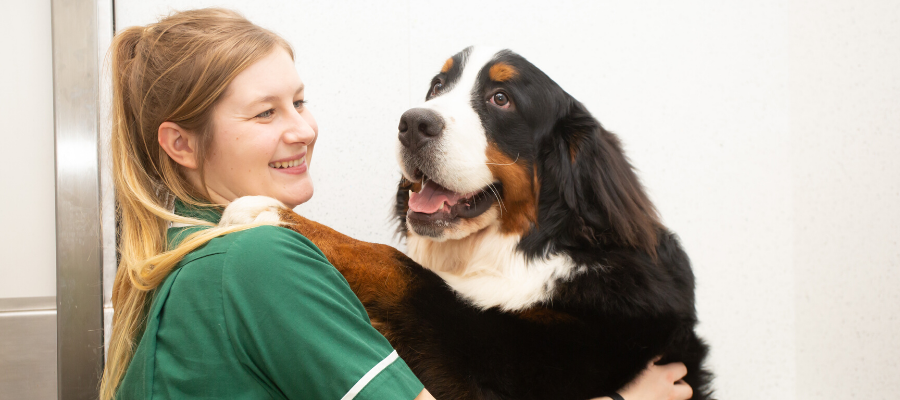Caesareans in bitches
Caesarean sections in bitches are classed as an emergency. Bitches should be able to naturally deliver their puppies and this is ideally done in a safe, familiar place for the bitch. However, under some circumstances, surgical intervention may be necessary to safely remove the puppies and ensure the health of the bitch.
Planned caesareans
We do not offer or recommend planned caesareans for several reasons. Firstly, dogs have a much shorter pregnancy (gestation period) compared to humans, with an average of 63 days. This means that the window for safe delivery of the puppies is much smaller– if you plan a caesarean too early, puppies may not have full lung development and the surgery will lead to foetal death. Canine semen can also live up to 7 days in the bitch, therefore it can be difficult to tell when exactly the bitch conceived and pinpoint the date she is due to give birth, risking the surgery being planned too early, or too late.
A caesarean is major surgery requiring a general anaesthetic, which always carries a risk to both bitch and puppies. The recovery period after the anaesthetic requires owners to monitor the bitch and puppies very closely until she is fully awake and coordinated to ensure accidents, for example puppies being squashed, do not occur. If a caesarean were carried out too early, she may not have an adequate milk supply to feed the puppies so they will require hand feeding every few hours, which can also affect the bond she has with her puppies. Furthermore, the opinion is shared widely in the veterinary field that offering planned caesareans may endorse the breeding of bitches that are medically unfit to breed naturally. The Royal College of Veterinary Surgeons, British Veterinary Association, British Small Animal Veterinary Association and the Kennel Club recommend reporting of caesareans in a bid to attempt to reduce the breeding of such dogs.
Bitches that are likely to have problems with birth
Some breeds are more predisposed to having problems naturally birthing puppies. Brachycephalic (short nosed) breeds like French Bulldogs, English Bulldogs and Pugs are at higher risk of birthing complications. Owners should be aware of this risk and be well prepared. It is recommended that you have a conversation with your vet if you are considering breeding. Once a bitch has required a caesarean, it is not recommended to breed from her again as there is a higher chance of repeated problems and surgery may present more difficulties due to previous scar tissue.
Whelping issues
It is important to be on stand-by around your dog’s due date and to prepare accordingly with a comfortable whelping box for mum and pups. In the last week of pregnancy your dog may begin searching for a safe and comfortable place to give birth. It’s a good idea to get her used to where you would like her to give birth but be prepared that she may prefer to be close to you or somewhere she feels comfortable, like your bedroom! Make sure to protect carpets and bedding.
During the last 24 hours of pregnancy you may notice behavioural signs that labour is imminent such as restlessness, panting and appetite loss. Physically you may see a small amount of red/brownish discharge from the vulva and a drop in rectal temperature to below 37.8°C.
When you need to contact a vet
-
Your dog is showing signs of general illness before, during or after whelping such as diarrhea, vomiting, shaking, wobbliness or stiffness. If they don’t seem ‘quite right’, speak to your vet.
-
Straining with no pup for more than 15-20 minutes.
-
Thick, green discharge with no puppy – this is a sign of a pup in distress.
-
More than a few drops of blood (some fluid or bloody discharge is normal though).
-
Signs of exhaustion in your dog or she seems to be struggling.
-
A puppy stuck in the birth canal. Never pull out a puppy, always speak to a vet for advice.
-
The time between puppies appearing can vary, but the gap between puppies should be no longer than 2 hours.
-
All puppies are not born within 24 of hours of labour starting.
-
Labour hasn’t started within 24 hours of a temperature drop.
-
If mum gives birth to any stillborn puppies, always get her checked over.
-
All placentas aren’t delivered, it can be difficult to keep track as Mum will usually eat the afterbirth quite quickly. Any unpassed afterbirth should break up and pass within 24-48 hours, usually when your dog toilets. If bloody or smelly vaginal discharge occurs after delivery, call your vet.
-
There are no signs of labour a few days after the due date.
-
Smelly or bloody discharge – vaginal discharge is normal for up to 6 weeks after birth, but it should not smell.
-
If any puppies are fading, seem unwell or aren’t nursing.
In the majority of cases, whelping should require no veterinary assistance, but as an owner you need to be prepared to contact your vet (or an emergency out of hours vet) if something goes wrong. It is also important to prepare financially for whelping emergencies, as most insurance policies will not cover costs associated with breeding or birth.
Call us on 01435 864422 if you have any questions about your bitch’s pregnancy.


